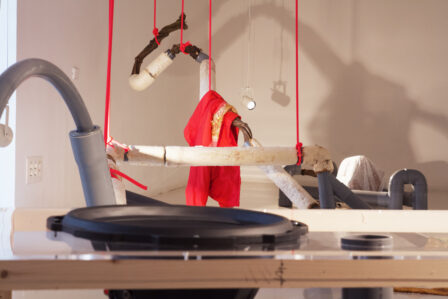Jose Begega
Long-term residency
May 2024 - 2026

Their gaze is interested in pleasure, mourning, shame, trauma, and the stigma of what they understand as “supporting characters.” In each project, we can see how they illuminate a new part of their biography, caressing that stigma from their experiences as a sex worker, HIV+, porn actor, junkie, and queer individual.1
They are the product of deconstruction, and also of a constructive process, where identity is generated from aspirational models, queer theory, science fiction, and conspiracy theories. It’s an unfinished result, a failure pretending success, an unresolved doubt. They are interested in the language of art as structure, and apply it as yet another language. Although their nature is performative both theoretically and practically, Jose Begega escapes any format but pursues them all. They consider that the artistic process exceeds the evident and the intentional, and therefore transcends the limits of the exhibition room and moves to “life”, where the encompassing concept dwells, questioning the surrounding world, the concept of success, and that of happiness itself.
Jose Begega is a non-binary artist who graduated in Fine Arts from the Polytechnic University of Valencia, with a Master’s degree in Artistic Production and Research from the University of Barcelona.
Recently, they have had a solo exhibition at the Fundació Joan Brossa as a Post-Brossa artist (Barcelona), another at Kocka Gallery with QueerANarchive (Split, Croatia), participated as an artist in the group exhibition “Narcohumanismo” curated by Nuria Gómez Gabriel and Eloy Fernández Porta at the Bòlit de Girona, and in the activity “Escucha Postraumática” curated by Pan-Pan Kolektiva at the Museo Nacional Centro de Arte Reina Sofía (Madrid); as a writer in the publication of the exhibition “Las Malas” at La Casa Encendida (Madrid) and in the publication “Verónica” at La Capella (Barcelona), within projects curated by Núria Gómez Gabriel, as well as in the publication “Ponerse en el Lugar del Otro” by Luz Broto at the Museu de Granollers. They have undertaken residencies at Etopia (Zaragoza), L’Estruch (Sabadell), and Matadero (Madrid).
Previously, they have exhibited their work at Gallery etHall (Barcelona), Palacio de Ronzón (Lena), Festival Pumpk (Pamplona), Cine Zumzeig (Barcelona), Espacio Nigredo (Madrid), Injuve (Madrid), Espositivo (Madrid), Nau Estruch (Sabadell), Hangar (Barcelona), CanFelipa (Barcelona), La Usurpada (Barcelona), A Tomar por Culo Fest (Bilbao), Arts Santa Monica (Barcelona), Salamina (Barcelona), Kunstgebäude (Stuttgart), Campo de Desconcentración Polivalente (Alcontar), Plaga (Barcelona), Liminal GR (Barcelona), TimeLab (Ghent), Doméstica (Barcelona), Palma Photo’14 (Palma de Mallorca), Pavilion Center Bucharest, Sala d’Art Jove (Barcelona), and Roodkapje Rotterdam among others.
1. This self-designation is used within the Queer and transmarikabollo movement as a mark of political identity and with the intention of subverting stigma. As marikas and yonquis, we choose to reclaim these terms to self-identify and take pride in them. Likewise, the masculine gender is used in this fragment because the artist has subsequently adopted the use of neutral language.
